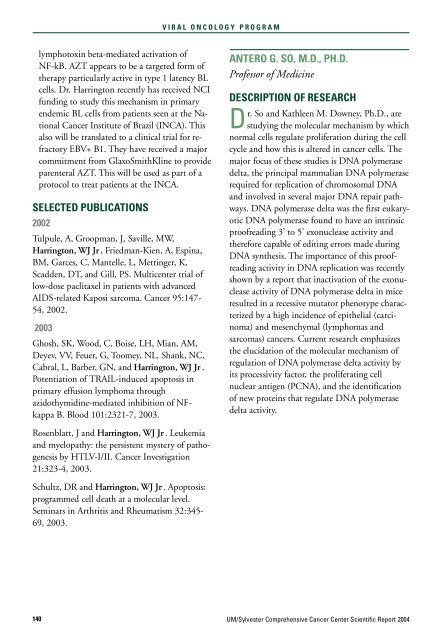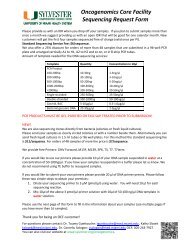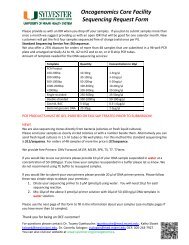SCIENTIFIC REPORT 2004 - Sylvester Comprehensive Cancer Center
SCIENTIFIC REPORT 2004 - Sylvester Comprehensive Cancer Center
SCIENTIFIC REPORT 2004 - Sylvester Comprehensive Cancer Center
You also want an ePaper? Increase the reach of your titles
YUMPU automatically turns print PDFs into web optimized ePapers that Google loves.
V I R A L O N C O L O G Y P R O G R A M<br />
lymphotoxin beta-mediated activation of<br />
NF-kB. AZT appears to be a targeted form of<br />
therapy particularly active in type 1 latency BL<br />
cells. Dr. Harrington recently has received NCI<br />
funding to study this mechanism in primary<br />
endemic BL cells from patients seen at the National<br />
<strong>Cancer</strong> Institute of Brazil (INCA). This<br />
also will be translated to a clinical trial for refractory<br />
EBV+ B1. They have received a major<br />
commitment from GlaxoSmithKline to provide<br />
parenteral AZT. This will be used as part of a<br />
protocol to treat patients at the INCA.<br />
SELECTED PUBLICATIONS<br />
2002<br />
Tulpule, A, Groopman, J, Saville, MW,<br />
Harrington, WJ Jr , Friedman-Kien, A, Espina,<br />
BM, Garces, C, Mantelle, L, Mettinger, K,<br />
Scadden, DT, and Gill, PS. Multicenter trial of<br />
low-dose paclitaxel in patients with advanced<br />
AIDS-related Kaposi sarcoma. <strong>Cancer</strong> 95:147-<br />
54, 2002.<br />
2003<br />
Ghosh, SK, Wood, C, Boise, LH, Mian, AM,<br />
Deyev, VV, Feuer, G, Toomey, NL, Shank, NC,<br />
Cabral, L, Barber, GN, and Harrington, WJ Jr .<br />
Potentiation of TRAIL-induced apoptosis in<br />
primary effusion lymphoma through<br />
azidothymidine-mediated inhibition of NFkappa<br />
B. Blood 101:2321-7, 2003.<br />
Rosenblatt, J and Harrington, WJ Jr . Leukemia<br />
and myelopathy: the persistent mystery of pathogenesis<br />
by HTLV-I/II. <strong>Cancer</strong> Investigation<br />
21:323-4, 2003.<br />
Schultz, DR and Harrington, WJ Jr . Apoptosis:<br />
programmed cell death at a molecular level.<br />
Seminars in Arthritis and Rheumatism 32:345-<br />
69, 2003.<br />
ANTERO G. SO, M.D., PH.D.<br />
Professor of Medicine<br />
DESCRIPTION OF RESEARCH<br />
Dr. So and Kathleen M. Downey, Ph.D., are<br />
studying the molecular mechanism by which<br />
normal cells regulate proliferation during the cell<br />
cycle and how this is altered in cancer cells. The<br />
major focus of these studies is DNA polymerase<br />
delta, the principal mammalian DNA polymerase<br />
required for replication of chromosomal DNA<br />
and involved in several major DNA repair pathways.<br />
DNA polymerase delta was the first eukaryotic<br />
DNA polymerase found to have an intrinsic<br />
proofreading 3’ to 5’ exonuclease activity and<br />
therefore capable of editing errors made during<br />
DNA synthesis. The importance of this proofreading<br />
activity in DNA replication was recently<br />
shown by a report that inactivation of the exonuclease<br />
activity of DNA polymerase delta in mice<br />
resulted in a recessive mutator phenotype characterized<br />
by a high incidence of epithelial (carcinoma)<br />
and mesenchymal (lymphomas and<br />
sarcomas) cancers. Current research emphasizes<br />
the elucidation of the molecular mechanism of<br />
regulation of DNA polymerase delta activity by<br />
its processivity factor, the proliferating cell<br />
nuclear antigen (PCNA), and the identification<br />
of new proteins that regulate DNA polymerase<br />
delta activity.<br />
140<br />
UM/<strong>Sylvester</strong> <strong>Comprehensive</strong> <strong>Cancer</strong> <strong>Center</strong> Scientific Report <strong>2004</strong>
















